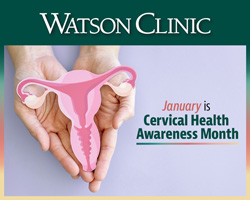
Here's something every woman should know about cervical cancer: It's almost always preventable.
Cervical cancer is rare in women who are regularly screened for it. And there's a vaccine that protects against its most common cause, the human papillomavirus (HPV).
Most cervical cancers start with precancerous changes that gradually turn into cancer. Screening can find these abnormal changes, which doctors can then treat. That stops cancer from ever developing.
Screening always includes the HPV test, a Pap test or both. These tests are simple and fast and consist of sample cells from the cervix. The HPV test looks for the virus that causes cervix cell changes, while the Pap test looks for cell changes or abnormal cells in the cervix..
Be sure to ask your doctor what the best screening schedule is for you. But in the meantime, here are the recommended guidelines:
• 21 to 39 years old: Get a Pap test every three years.
• 30 to 65 years old: Get a Pap test and an HPV test every five years or a Pap test every three years.
• Over 65 years old: Consult your women’s health professional regarding a screening regiment that’s right for you. You may be able to stop testing IF you have had both regular and negative Pap screening for 20 yrs.
You should consult your doctor to determine the screening program that works best for you. Call 863-680-7243 to schedule an appointment with a member of Watson Clinic’s OB-GYN department.
Additional sources: American College of Obstetricians and Gynecologists; Centers for Disease Control and Prevention; National Cancer Institute; U.S. Preventive Services Task Force